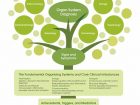
Beyond symptoms
By Mike Straus
Features Clinical Patient CareIncorporating principles of functional medicine into practice
 Photo: Fotolia
Photo: FotoliaOver the past several years, health disciplines of all kinds have been undergoing a revolution. Physicians and practitioners of all stripes are now calling for more integrated and holistic, systems-based approaches that address underlying root causes rather than symptoms. While this call for an interdisciplinary approach is now widely popular among health-care professionals, the appreciation of the interdisciplinary movement started with the introduction of functional medicine as a formal medical theory.
Chiropractic and functional medicine have a shared history, one that allows for easy collaboration and cross-pollination of research. It should come as no surprise, then, that the principles and findings of functional medicine are easy to employ in chiropractic treatment settings. Functional medicine can provide chiropractic patients with a number of health benefits, and with the infrastructure already in place, the chiropractic setting is fertile ground for the implementation of functional medicine practices.
Origins
Functional medicine may sound like a new treatment, but its practitioners say it’s rooted in health-care practices and principles that are thousands of years old.
Dr. Victoria Coleman is a chiropractor in London, Ont., who is certified in functional medicine. She is the vice-president of clinical education for Atrium Innovations and the former president of Douglas Laboratories.
“Functional medicine’s principles have always been present in the foundation of chiropractic medicine,” she says. “The philosophy [of chiropractic] says that the body has an innate wisdom. We’re at a great time in chiropractic medicine. We understand nutrition. We understand things that happen at a cellular level when we do an adjustment. Treating the person as a whole is the chiropractic way.”
Dr. Leah Stadelmann, functional medicine practitioner and owner of Chief Chiropractic in Squamish, B.C., notes that functional medicine originated as a proactive treatment method that pinpoints causes, not symptoms.
“When I think of functional medicine, I think of medicine that looks at patients from the perspective of how fundamental physiological processes and different environments affect patients. It’s hard to look at chiropractic and functional medicine and dissociate one from the other.”
Although functional medicine is rooted in treatments and theories that pre-date modern medicine, it wasn’t until biochemist Dr. Jeffrey Bland established the Institute for Functional Medicine in 1991 that the theoretical framework of functional medicine was formally organized into a system of principles and practices. Over the last 25 years, the Institute for Functional Medicine has expanded from a pure research capacity into developing clinical applications for practitioners.
Science-based
The great strength of functional medicine is that its emphasis on causes allows for more comprehensive treatments that resolve problems before they begin. In functional medicine, biological, environmental and lifestyle factors are viewed from a systems-style approach that assesses the impact of each and finds areas where treatment is most effective.
Coleman notes that functional medicine operates on the same principles as a firearm.
“It’s actually quite simple,” she says. “Genetics loads the gun, and then the environment pulls the trigger. The modifiable factors you can address, like nutrition and social relationships, can affect chronic disease and either manifest as disease or not.”
She points to the interaction of gene and environment as the core mechanism underlying functional medicine.
“We can turn genes on and off. That’s just one component. It comes down to moderation. We need to love and care more. We need to move. We need to eat well. That’s how you modify disease expression.”
Stadelmann notes that functional medicine is drawing on past research to change the way genetics is understood.
“We think of genes as destiny. But what we eat, where we live, and how clean our air is all contribute to the way the gene is expressed. Modifiable lifestyle factors are the key places where we can make a change. The environment can cause inflammation in the body and damage blood vessels, and that results in the diseases we see.”
It’s this interaction between genes and environment that is driving a shift away from the biomedical model of disease and treatment and toward a more integrated approach. Much like the similar biopsychosocial model, functional medicine pulls together research and findings from diverse disciplines in order to create treatments that interrupt the disease process at the start.
The underlying principles of functional medicine are also backed by a variety of studies, such as Stroebe et al (1998) and Elwert et al (2008). Such studies have found a significantly increased risk of death among those who recently lost a loved one, even among participants whose health habits remained consistent before and after the loved one’s death.
Benefits
Functional medicine offers a variety of benefits in chiropractic treatment, ranging from a mere change of mindset to more effective treatments and better health outcomes. Stadelmann notes that functional medicine’s emphasis on defining health as optimal functioning rather than the mere absence of disease has benefits for overall well-being.
“Functional medicine improves the treatment process because we’re starting to address foundational root causes. We’re not just doing a quick fix. We’re restoring health,” he remarks.
Functional medicine can lead physicians to improve their mindfulness of patient complaints and have a fuller picture of the illness, according to Coleman.
“The foundation of functional medicine is that it’s not symptom-based,” she explains. “You have to look for root causes. Listening to the patient and letting the story unfold, and then retelling the story back to the patient to make sure you got it right [is what keeps practitioners more mindful of health concerns beyond mere symptoms].”
Functional medicine also has real benefits in terms of reductions in recovery time and improvements in patient self-reports. Stadelmann notes studies have shown a strong link between high-intensity turbo training and a variety of health outcomes like lower cholesterol levels, increased weight loss, more efficient glucose maintenance, and much more.
“That still only shows us one piece of the puzzle,” she says, “but it’s definitely proving that we need to integrate exercise into care programs.”
Practical applications
“The limitation in chiropractic,” says Stadelmann, “is that the scope of practice limits our capacity to do some of the advanced functional medicine diagnostics. At least here in British Columbia, we can’t always order the blood tests we want. And even if we can, then it’s coming out of the patient’s pocket, which is a difficulty.”
Stadelmann notes that the most significant areas where chiropractors can have an influence are in changing patient lifestyle factors like diet, exercise and sleep. She adds there are a number of research initiatives currently investigating the connection between nutrition and the mechanisms of disease – and that means chiropractors may benefit from interdisciplinary partnerships with nutritionists.
She points out, “[One way chiropractors can start applying functional medicine is to] start patients on a food diary and look for things that cause inflammation. Encourage patients to get involved in exercise. Help patients reduce their stress. We’re in a very good position to offer advice and information that patients can implement right away.”
Stadelmann suggests contacting the Institute for Functional Medicine for further resources.
“They’re a phenomenal resource,” Stadelmann notes. “They have everything from food diary guides to sample diets to relaxation techniques. They also have questionnaires that practitioners can give patients. From a nutritional perspective, following some of the leaders in the ancestral food movement is a good idea.”
In her practice, Coleman uses the five key modifiable personal lifestyle areas to enhance recovery. Rather than simply discuss chiropractic remedies, she talks to her patients about stress, sleep and relaxation, nutrition, exercise and relationships.
“When you’re working with a patient, you can create a better treatment plan by keeping those five modifiable lifestyle areas in mind. If a patient isn’t sleeping, then they’re not producing the hormone cascade that is necessary for healing. So talk about sleep and relaxation. Then have a discussion about eating real food again – taking back the kitchen.”
Coleman says chiropractors who want to help patients see strong benefits in a short span of time should specifically address stress when talking with patients.
“We’ve never before seen a society that is so highly stressed,” she says. “The cavemen aren’t coming back to the fire – they’re staying out all night fighting the sabre-tooth tigers. Teen stress is at an all-time high. It’s unsustainable.”
Chiropractors are in a prime position to advocate for whole-body wellness. Chiropractic medicine’s history as a discipline focusing on the natural causes of disease and their impact on human physiology means that the general ideas and main principles of functional medicine are already present. That means functional medicine is readily implemented in practice, and chiropractors who employ functional medicine practices are seeing strong results.
With a focus on the various causes of disease and a mindfulness of long-term strategies like modifying lifestyle factors, chiropractors can help patients to experience long-lasting healing that goes well beyond simply treating symptoms and promotes health not as the absence of disease, but as a state of well-being.
Useful Resources
Considering factors like nutrition, sleep, and exercise is a great way to start delving into the world of functional medicine and helping patients to see long-term health benefits. Chiropractors who wish to further investigate functional medicine would benefit from the resources available through the Institute for Functional Medicine and similar organizations.
functionalmedicine.org/getstarted
The Institute for Functional Medicine offers a variety of free courses that can help medical professionals to understand the basics. These brief courses centre around specific aspects of functional medicine and how they can prevent or reverse chronic disease. The institute’s flagship program is a paid five-day course that teaches health-care professionals how to integrate clinical insights and research-proven methodology into disease treatment and prevention.
functionalmedicineuniversity.com
Functional Medicine University is a continuing education institution that offers certificate programs in functional medicine. FMU is accredited in most American states, and the entire 200-hour curriculum is available as an online distance education course. The curriculum covers topics such as the immune system, oxidative stress, inflammation, nutrition, and the endocrine system.
ichnfm.org
The International College of Human Nutrition and Functional Medicine is an educational institute that offers continuing education and certificate courses in functional medicine. The organization also manages the International Journal of Human Nutrition and Functional Medicine.
MIKE STRAUS is a freelance writer living in Kelowna, British Columbia. You can reach him at mike@strauscopywriting.com
Print this page

